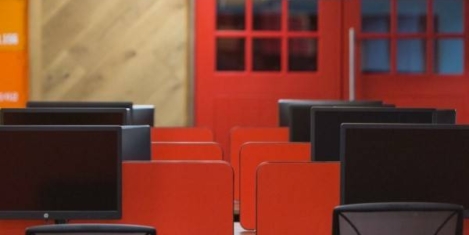July 13, 2017
Employers must prepare for emerging technologies that will reshape work by 2030 0
 Emerging technologies such as artificial intelligence, robotics, virtual reality, augmented reality and cloud computing, will transform our lives and how we work over the next decade; and by 2030 every organisation will be a technology organisation. As such businesses need to start thinking today about how to future-proof their infrastructure and workforce, according to a report published by Dell Technologies. The research, led by the Institute for the Future (IFTF) alongside 20 technology, academic and business experts from across the globe also offers insight on how consumers and businesses can prepare for a society in flux. ‘The Next Era of Human-Machine Partnerships’ forecasts that emerging technologies, supported by massive advancements in software, big data and processing power, will reshape lives. The report predicts that an estimated 85 percent of jobs in 2030 haven’t been invented yet. The pace of change will be so rapid that people will learn “in-the-moment” using new technologies such as augmented reality and virtual reality. The ability to gain new knowledge will be more valuable than the knowledge itself.
Emerging technologies such as artificial intelligence, robotics, virtual reality, augmented reality and cloud computing, will transform our lives and how we work over the next decade; and by 2030 every organisation will be a technology organisation. As such businesses need to start thinking today about how to future-proof their infrastructure and workforce, according to a report published by Dell Technologies. The research, led by the Institute for the Future (IFTF) alongside 20 technology, academic and business experts from across the globe also offers insight on how consumers and businesses can prepare for a society in flux. ‘The Next Era of Human-Machine Partnerships’ forecasts that emerging technologies, supported by massive advancements in software, big data and processing power, will reshape lives. The report predicts that an estimated 85 percent of jobs in 2030 haven’t been invented yet. The pace of change will be so rapid that people will learn “in-the-moment” using new technologies such as augmented reality and virtual reality. The ability to gain new knowledge will be more valuable than the knowledge itself.













 A majority of employees (62 percent) believe their company culture is one of the biggest hurdles in the journey to becoming a digital organisation, and this is putting companies at risk in falling behind competition in today’s digital environment claims a new report.
A majority of employees (62 percent) believe their company culture is one of the biggest hurdles in the journey to becoming a digital organisation, and this is putting companies at risk in falling behind competition in today’s digital environment claims a new report. 




















 The majority of UK employees recognise the importance of data literacy to their career progression, but half have never been offered any relevant training. Statistics from a study of over 3,000 UK employees shows they understand the growing significance of data within their organisation, with almost all (94 percent) of those surveyed stateing that they consider data to be important for performing their role. Data skills were ranked as fourth in a list of the most important skills for their job – with only traditional, ‘soft’ skills such as ‘communication’, ‘organisation’ and ‘people management’ ranking higher. Yet the Censuswide survey, commissioned by Tableau revealed that despite four in five professionals (84 percent) believing data skills will be important for their career progression and a similar percentage (83 percent) using data on a weekly basis as part of their role, nearly half (49 percent) say their employer hasn’t offered them any kind of data analytics training.
The majority of UK employees recognise the importance of data literacy to their career progression, but half have never been offered any relevant training. Statistics from a study of over 3,000 UK employees shows they understand the growing significance of data within their organisation, with almost all (94 percent) of those surveyed stateing that they consider data to be important for performing their role. Data skills were ranked as fourth in a list of the most important skills for their job – with only traditional, ‘soft’ skills such as ‘communication’, ‘organisation’ and ‘people management’ ranking higher. Yet the Censuswide survey, commissioned by Tableau revealed that despite four in five professionals (84 percent) believing data skills will be important for their career progression and a similar percentage (83 percent) using data on a weekly basis as part of their role, nearly half (49 percent) say their employer hasn’t offered them any kind of data analytics training.


 More than six in ten workers value happiness at work over salary and even those more motivated by salary agree that a setting that allows friendships to flourish could provide invaluable benefits for businesses, a new survey suggests. The research by Wildgoose found that 57 percent of respondents thought having a best friend in the office made their time at work more enjoyable, almost a third were more productive and over one in five said it boosted their creativity. The survey also highlighted the differences in attitudes across various groups and demographics. Women were far more likely to prioritise happiness, with eight in ten placing it above salary, compared to just 55 percent of males. The job level of an employee also played a significant role. For 85 percent of managers, salary was deemed more important, while 70 percent of entry-level, interns, and executives chose happiness.
More than six in ten workers value happiness at work over salary and even those more motivated by salary agree that a setting that allows friendships to flourish could provide invaluable benefits for businesses, a new survey suggests. The research by Wildgoose found that 57 percent of respondents thought having a best friend in the office made their time at work more enjoyable, almost a third were more productive and over one in five said it boosted their creativity. The survey also highlighted the differences in attitudes across various groups and demographics. Women were far more likely to prioritise happiness, with eight in ten placing it above salary, compared to just 55 percent of males. The job level of an employee also played a significant role. For 85 percent of managers, salary was deemed more important, while 70 percent of entry-level, interns, and executives chose happiness.










June 12, 2017
We need to design for a multigenerational workforce 0
by Joe Huddleston • Comment, Workplace design
(more…)